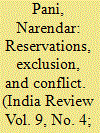| Srl | Item |
| 1 |
ID:
101082


|
|
|
|
|
| Publication |
2010.
|
| Summary/Abstract |
Research on outsourced operations has primarily focused on working conditions in call centers. This study sought to focus attention on other outsourced operations to document employees' experience of shift work. In-depth interviews with both management and employees at two Indian organizations suggest that the negative consequences of shift work and working conditions are not merely individual problems, but they have adverse consequences for organizations as well. In particular, the study suggests that high attrition rates in the outsourcing industry may be an indirect result of shift work, indicating that shifting operations from India to other offshore locations may not resolve the issue. A model linking the effect of shift work on employees to attrition rates is proposed, and implications for future research and strategies organizations can implement to minimize the impact of shift work on employees' health and performance are discussed.
|
|
|
|
|
|
|
|
|
|
|
|
|
|
|
|
| 2 |
ID:
101083


|
|
|
|
|
| Publication |
2010.
|
| Summary/Abstract |
The three books under review offer a fascinating account of how the processes of democracy and the practices of the modern Indian state have refashioned caste as an important feature of social stratification and self-definition. But the implication of the recasting of caste varies in the three accounts. According to Zoya Hasan, caste is an important marker of socio-economic backwardness and the policies of affirmative action that are based on this disadvantage should be extended to minorities. For Lucia Michelutti, electoral politics has refashioned caste into ethnic groups. The ethnicization of caste is premised on the horizontal solidarities of fictive kin groups. For Anupama Rao, the politics of dalit emacipation from caste atrocities has paradoxically exposed dalits to further acts of violence. Together, these books offer a compelling account of the formation of political subjects in modern India
|
|
|
|
|
|
|
|
|
|
|
|
|
|
|
|
| 3 |
ID:
101081


|
|
|
|
|
| Publication |
2010.
|
| Summary/Abstract |
Caste-based reservations (quotas) in government jobs and admissions to educational institutions in India have been associated with bouts of sometimes intense social conflict. The debate about this conflict has focused primarily on the case for and against reservations per se. Even when variations have been noticed in the degree of conflict generated by reservations across regions, the tendency has been to attribute the differences to local social conditions. Very little attention has been paid to the question of whether the type of reservations implemented in each region influences the nature and extent of conflict. This article attempts to answer this question by comparing the Mandal Commission Report with the experience of princely Mysore, and later Karnataka. Abstracting from these experiences, the article develops two concepts: reservations with exclusion and reservations without exclusion. It goes on to argue that reservations with exclusion create greater conflict.
|
|
|
|
|
|
|
|
|
|
|
|
|
|
|
|